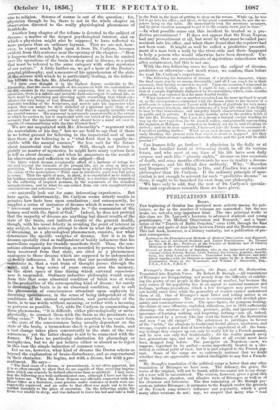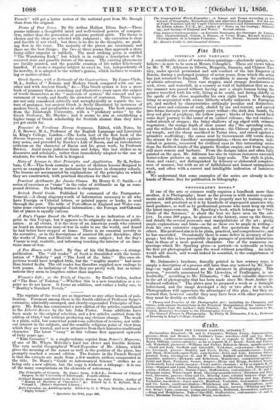PUBLICATIONS BECVVED.
Boors.
THE beginning of October -has produced more activity among the pub- lishers, so far as the number of volumes are concerned.; _brit the new hooks are •not-of-a.verj iraliortant -kind. The two principal works in this class are Dr. La code's Lectures to advanced students and young practitioners, " on Medical Observation and Research," . and a trans- lation of the "Travels of Rabbi Petachia," circa 1180, through the East of Europe and parts of Asia lying between Persia and-the Mediterranean. This last book, however, is a literary curiosity, not a publication of pre- sent consequence.
Lectures on the .Principles and Methods of Medical Observation and Research, for the use of Advanced Students grid Junior Practitioners. By Thomas Laycock, M.D., Ike., Professor of the Practice of Medicine and of Clinical Medicine in the University-of Edinburgh.
Travels of Rabbi Petachia of Ratisbon, who in the .latter end of the twelfth century visited Poland, Russia, Little Tartary, the Crimea, Armenia, Assyria, Syria, the Holy Land, and Greece. Translated from the Hebrew,. and pub- lished together with the Original on opposite pages, by Dr. A. Beiuseh, with Explanatory. Notes by the Translator, and William F. Ainsworth, Esq., F.S.A., F.G.S., F.R.G.S.
Beranger's Songs - on the Empire, the Peace, and the Restoration. Translated into English Verse. By- Robert B. -Brough.—All translations of Beranger are disappointing, not merely from the difficulty of exhibit- ing the poetry of one people in the language of another, but because the very source of his popularity lies in an appeal to national manners and feelings, perhaps prejudices, which a few foreigners may perceive but can hardly enter into, while the generality of readers cannot understand them at all. One of Beranger's most bitter and telling satires is on the returned emigrants. The picture is overrunning with devilish plea- santry and contemptuous scorn. The spare figure, the pompous beaarinnngg, the claims at once offensive, exploded, ridiculous, yet in 1816 sufficiently alarming—the mixture of poverty, pretence, pride, and ignorance—the ignorance of learning nothing and forgetting nothing—can all, indeed, be understood by a person who has read the history of the Restoration and seen "an old emigre." The references to privileges in favour of the "noble," the allusions to traditional feudal abuses, insolences, and wrongs, require a good deal of knowledge to apprehend at all : the burn- ing feelings they conjure up can only be really felt by a Freneh.peaaarit, and he now can only feel traditionally ; for the .reality passed . away two generations ago, and one of the claims at all events must have been -dropped long before. The panegyric on Napoleon—now, we suppose, regretted by its author—seems imperfectly treated in a rhe- torical or critical point of view, but it is lust adapted to the French pets sant. Some of the songs are so extremely national that we dolibt whether they. are appreciable or indeed intelligible to any but French- man. Mr. Brough's translation of the political songs is better than any other translation of Beranger we have seen. The delicacy, the grace, the verve of the original, will not be found, while too coarse not to say slang- ish a tone will be encountered. The veision, howeVer, gives a goal idea of the boldness, abandon, and allusive style of Beranger, as well as of his clearness and bitterness. The free translation of Mr. Brough pre- sents an inferior Beranger; it intimates to the English reader the grounds of the French song.writer's influence and popularity, which a good many other versions do not; nay, we suspect that many who " read
French" will get a better notion of the national poet from Mr. Brough than from the original.
Poems of Past Years. By Sir Arthur Hallam Elton, Bart.—These poems indicate a thoughtful mind and well-trained powers of composi- tion, rather than the possession of genuine poetical spirit. The theme is chosen and the ideas are selected with judgment ; the execution is clear and forcible if not vivid; but there is no fire in the thoughts, no gush- ing flow in the verse. The majority of the pieces are occasional, and these are the best things; the two or three poems that approach a story being either singular or unlikely. The most striking poem is entitled " The Wandering Rock;" but which is in reality a description of the received state and possible future of the moon. The existing phenomena are lucidly painted, and the possible creation of life rather felicitously handled. It seems a singular subject to excel in, but, independently of its novelty, it is adapted to the writer's genius, which inclines to reason- ing or matter-of-fact.
Greek Syntax, with a Rationale of the Constructions. By James Clyde, M.A., Author of " Romaie and Modern Greek compared with one an- other and with Ancient Greek," &c.—This Greek syntax is less a mere book of grammar than a searching and illustrative essay upon the subject of words themselves as the " materials of syntax," the concord and go- vernment of words, and finally the structure of sentences. These topics are not only considered critically and metaphysically as regards the na- ture of grammar, but ancient Greek is freely illustrated by instances of modern Greek, and peculiarities in other languages. The book emanates from the Edinburgh University, with a prefatory notice " by the Greek Professor, Mr. Blackie • and it seems to aim at establishing a higher range of Greek scholarship for Scottish alumni than they have yet got credit for.
Francisci de Verulasno Novum Organum. Edited, with Notes, by J. S. Brewer, M.A., Professor of the English Language and Literature in King's College, London.—The Latin text of the first book of the Novum Organum, and part of the second, followed by English explana- tory notes, and preceded by Rawley's Life of Bacon, and an introductory criticism on the character of Bacon and his great work, by Professor Brewer. Amid many judicious hints and helps, this last strikes us as discursive and scholastic, rather than immediately adapted to the use of students, for whom the book is designed.
Notes of Lessons in their _Principles and Application. By a„ Spam- ham, C.M.—This book contains a series of skeleton lessons designed to serve as examples for use or imitation by teachers in elementry schools. The lessons are accompanied by explanations of the principles on which they are constructed, with practical directions for their use.
Practical Arithmetic for Junior Classes. By Henry G. C. Smith.—A series of exercises or "sums " in the rules of arithmetic as flys as com- pound division. Its leading feature is cheapness.
British Postal Guide. Published by command of the Postmaster- General.—A cheap sixpennyworth of information necessary to all who have Foreign or Colonial letters, or printed papers or books, to send through the post. The table of Post-offices in England and Wales con- tains some curious topographical information ; the Foreign and Colonial list of places is equally curious.
A. Boy's Voyage Round the World.—There is no indication of a re- print in this Voyage, but it appears to be originally an American publi- cation : at all events, it is the story of an American youth who entered on board an American man-of-war in order to see the world, and found he had better have stopped at home. There is no essential novelty in the narrative, or in the descriptions of nautical life and discipline, after the works of Dana and Merivale on the same subject ; but the Boy's Voyage is real, readable, and informing touching the interior of an Ame- rican man-of-war.
A Few Hours with Scott. By One of his Old Readers.—A strange publication. The "old reader" of Scott is dissatisfied with the termi- nation of " Rokeby " and " The Lord of the Isles." His own ob- jections would have weighed little, but the "mighty master" had more than hinted faults. The old reader has therefore supplied new endings to both poems. As imitations of Scott they are pretty well, but as termi-
nations they seem to lengthen rather than improve. • •
Woman's _Life ; or the Trials of Caprice. By Emilie Carlen, Author of "The Rose of Tisieton."—Whether this is a new translation or a re- print we do not know. It forms an addition, and rather a bulky one, to Bentley's Standard Novels."
The reprints of the week are as important as any other branch of pub- lication. Foremost among them is the fourth edition of Professor Syme's extensive, admirably-arranged, and clearly-expounded Principles of Sur- gery. Mr. Bohn has commenced a new edition of the articles contributed to the Eclectic Review by the late John Foster. Some additions have been made to the original selection, and a few articles omitted from the edition of l844,* but without producing any obvious change. The work is a plain, solid, but somewhat ponderous collection of reviews, not with- out interest in the subjects, and the sensibly religious point of view from which they are treated, and now attractive from their historico-traditional character. The latest " essay " in this volume first appeared upwards of forty years ago. "Kate Coventry" is a single-volume reprint from _Fraser's Magazine, of one of Mr. Whyte Melville's hard but clever and forcible fictions. The very useful Geographical Word-Expositor of Mr. Adams, which gives the meaning of the names as well as the position of the place, has promptly reached a second edition. The feature in the French Recueil is that the extracts are made from a few modern authors enumerated in the title. - Dr. Mann's " Guide to Astronomical Science " strikes us as being only a new edition, but the copy is without a titlepage : it is one of the many compilations on the elements of astronomy.
The Principles of Surgery. By James Syme, F.R.S.E., Professor of Clinical Surgery in the University of Edinburgh. Fourth edition.
Critical Essays contributed to the Eclectic Review by John Foster, Author of "Essays on _Decision of Character," 4-c. Edited by J. E. Ryland, M.A. Volume I. (Bohn's Standard Library.) Kate Coventry, an Autobiography. Edited by G. J. Whyte Melville, Author of "Digby Grand."
* Spectator for 1844, page 496. The Geographical Word-Expositor; or Names and Terms occurring in the Science of Geography, Etymologically and otherwise Explained. For the use of Pupil Teachers and the Upper Classes in Classical and Elementary Schools, By Edwin Adams, T.C.B., 8r.c., Author of " Notes on the Geology, Mineral- ogy, and Springs of England and Wales." Second edition.
Cinq Auteurs Contemporains ; ou Extraits Nouveaux des Onvrages de Lamar. tine, Chateaubriand, Guizot, A. Dumas, et Victor Hugo, Recueil destine a l'Enseignment de la Langue Franeaise. Par Dr. Dubuc. Seconde editione. Dr. Mann's Guide to Astronomical Science.



























 Previous page
Previous page